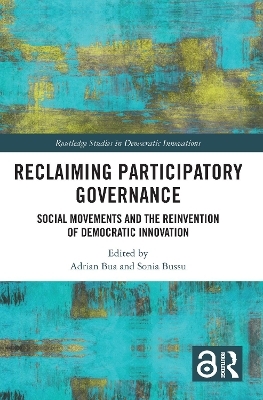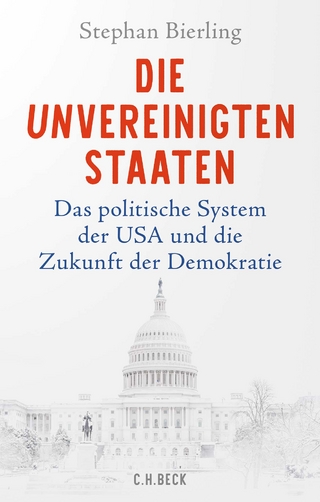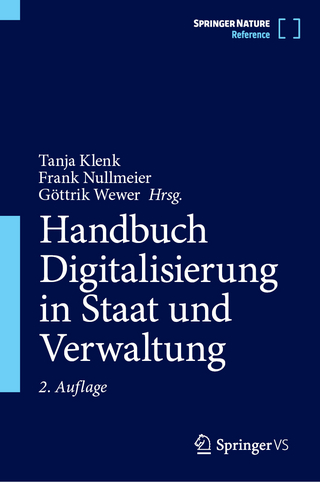
Reclaiming Participatory Governance
Routledge (Verlag)
978-1-032-11125-4 (ISBN)
One of the most interesting political developments of the past decade has been the adoption by social movements of strategies seeking to change political institutions through participatory governance. These strategies have flourished in a variety of contexts, from anti-austerity and pro-social justice protests in Spain, to movements demanding climate transition and race equality in the UK and the USA, to constitutional reforms in Belgium and Iceland. The chief ambition and challenge of these new forms of participatory governance is to institutionalise the prefigurative politics and social justice values that inspired them in the first place, by mobilising the bureaucracy to respond to their claims for reforms and rights. The authors of this volume assess how participatory governance is being transformed and explore the impact of such changes, providing timely critical reflections on: the constraints imposed by cultural, economic and political power relations on these new empowered participatory spaces; the potential of this new "wave" of participatory democracy to reimagine the relationship between citizens and traditional institutions towards more radical democratic renewal; where and how these new democratisation efforts sit within the representative state; and how tensions between the different demands of lay citizens, organised civil society and public officials are being managed.
This book will be an important resource for students and academics in political science, public administration and social policy, as well as activists, practitioners and policymakers interested in supporting innovative engagement for deeper social transformation.
Chapter 11 of this book is freely available as a downloadable Open Access PDF at http://www.taylorfrancis.com under a Creative Commons Attribution-Non Commercial-No Derivatives (CC-BY-NC-ND) 4.0 license.
Adrian Bua is Lecturer in Urban Politics in the Department of Politics and International Relations, and a member of the Centre for Urban Research on Austerity, at De Montfort University, UK. His latest work spans democratic theory, urban studies and political economy. Sonia Bussu is Associate Professor in Public Policy at INLOGOV at the University of Birmingham, UK. Her research and published work focus on participatory governance, coproduction and participatory research.
1. Introduction to the Volume Section 1: Conceptualising Democracy-driven Governance 2. Challenging the "Rules of the Game": The Role of Bottom-up Participatory Experiments for Deliberative Democracy 3. Innovations in Participatory Governance and the (De)commodification of Social Wellbeing 4. Can Local Participation Disrupt Neoliberalism? The Politics and Ethics of Caring for Democracy 5. The Democratic Multiverse: Governance, Associations and the Prospects for Progressive Democratic Renewal Section 2: Tracing Emergence of Democracy-driven Governance 6. Towards Participatory Transition Governance: The Role of Social Movements as "Collaborators" for Democratic Innovation 7. "Be Like Water": Participatory Arts, Prefigurative Social Movements and Democratic Renewal 8. Whose and What Right to the City? Insights from Lisbon 9. De-POLARizing Civic Participation? Lessons from the Incomplete Experience of Greenland 10. Collective Candidacies and Mandates in Brazil: Challenges and Pitfalls of a Gambiarra 11. Democracy-driven Governance and Governance-driven Democratization in Barcelona and Nantes Section 3: Assessing the Challenges to Projects of Radical Reform 12. Expanding Participatory Governance Through Digital Platforms? Drivers and Obstacles in the Implementation of the Decidim Platform 13. The Embeddedness of Public-common Institutions: The Citizen Assets Programme in Barcelona 14. How Can Democracy-driven Governance Turn into Techno-populism? Arguing on the Case of Ahora Madrid 15. Surfing Disappointment: The Uneasy Inclusion of Social Movement Activists in Local Participatory Institutions. A Case-study in Madrid (2015–2019) 16. Institutionalising Participation from Below: From the Shack to Municipal Elections in Commercy, France Section 4: Conclusion 17. Concluding Remarks: Towards the Messy Middle. The Next Generation of Democracy-driven Governance Research
| Erscheinungsdatum | 11.09.2024 |
|---|---|
| Reihe/Serie | Routledge Studies in Democratic Innovations |
| Zusatzinfo | 6 Tables, black and white; 1 Line drawings, black and white; 1 Halftones, color; 4 Halftones, black and white; 1 Illustrations, color; 5 Illustrations, black and white |
| Verlagsort | London |
| Sprache | englisch |
| Maße | 156 x 234 mm |
| Gewicht | 453 g |
| Themenwelt | Sozialwissenschaften ► Politik / Verwaltung ► Politische Systeme |
| Sozialwissenschaften ► Politik / Verwaltung ► Staat / Verwaltung | |
| ISBN-10 | 1-032-11125-9 / 1032111259 |
| ISBN-13 | 978-1-032-11125-4 / 9781032111254 |
| Zustand | Neuware |
| Informationen gemäß Produktsicherheitsverordnung (GPSR) | |
| Haben Sie eine Frage zum Produkt? |
aus dem Bereich


